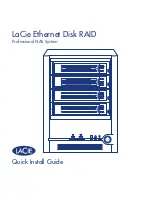
1.7.2
Conducted noise
The drive is expected to operate with a maximum of:
•
150 mV peak-to-peak triangular-wave injected noise at the power
connector. The frequency is 10 Hz to 100 KHz with equivalent resistive
loads.*
•
100 mV peak-to-peak triangular-wave injected noise at the power
connector. The frequency is 100 KHz to 10 MHz with equivalent
resistive loads.*
* Equivalent resistance is calculated by dividing the respective volt-
age by the typical RMS read/write current.
1.7.3
Power-management modes
The drive supports the following power-management modes:
•
Active mode. The drive is seeking, reading or writing.
•
Idle mode. When the drive receives an Idle Immediate command, or
the idle timer counts down to zero, the drive enters the Idle mode. In
Idle mode, the spindle remains up to speed. The SeaCache buffer
remains enabled, and the drive accepts all commands and returns to
the Active mode whenever a seek, read or write operation is needed.
•
Standby mode. When the drive receives a Standby Immediate com-
mand, or the standby timer has counted down to zero, the drive enters
the Standby mode. In the Standby mode, the SeaCache buffer re-
mains enabled, the heads are parked in the shipping zone and the
spindle is stopped. The drive accepts all commands and returns to the
Active mode whenever a seek, read or write operation is needed.
•
Sleep mode. When the drive receives a Sleep Immediate command,
it enters the Sleep mode. The heads are parked in the shipping zone
and the spindle is at rest. A hard reset or a soft reset returns the drive
to Active mode. A soft reset preserves the current emulation and
translation parameters.
1.7.3.1
Idle and Standby timers
The drive can enter the Idle mode or the Standby mode by either of two
methods:
•
The computer sends an Idle Immediate command or a Standby
Immediate command.
•
The idle timer or the standby timer counts down to zero.
Medalist XE Family Product Manual, Rev. B
5














































